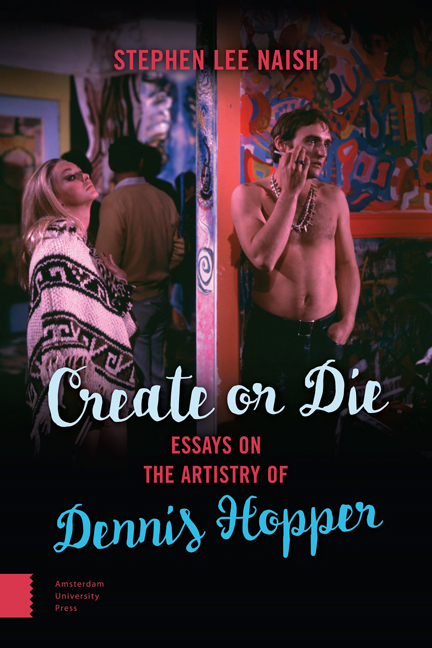Book contents
- Fronmatter
- Dedication
- Contents
- Introduction
- Scenes from a Revolutionary Life: How Dennis Hopper Conquered the American Century
- Hip-Hopp: Dennis Hopper and Music
- The Elephant in the Room: Dennis Hopper and American Politics
- Love and Hate: The Conflict of Emotions in The Blackout and Carried Away
- Commercial Breakdown: Dennis Hopper in the World of Advertisements
- White Light/White Heat: Actor and Character Collide in White Star
- Double Standards: The Art and Photography of Dennis Hopper
- Coda: The Fourth Wall
- Acknowledgements
- Notes
- Bibliography
White Light/White Heat: Actor and Character Collide in White Star
Published online by Cambridge University Press: 11 December 2020
- Fronmatter
- Dedication
- Contents
- Introduction
- Scenes from a Revolutionary Life: How Dennis Hopper Conquered the American Century
- Hip-Hopp: Dennis Hopper and Music
- The Elephant in the Room: Dennis Hopper and American Politics
- Love and Hate: The Conflict of Emotions in The Blackout and Carried Away
- Commercial Breakdown: Dennis Hopper in the World of Advertisements
- White Light/White Heat: Actor and Character Collide in White Star
- Double Standards: The Art and Photography of Dennis Hopper
- Coda: The Fourth Wall
- Acknowledgements
- Notes
- Bibliography
Summary
The method acting approach, which Dennis Hopper employed throughout his film career, informs the actor that in order to portray the truth on screen, one must believe and immerse oneself within the world and the situations of the character being portrayed. Constantin Stanislavski, the Russian Theatre director, acting coach, and originator of the method, contemplates this in his book An Actor's Handbook: “Find out all the reasons which justify the actions for your character and then act without reflecting about just where your ‘own’ actions end and ‘his’ begin.” The period between The Last Movie and Blue Velvet saw many examples of Hopper merging his own persona with that of his troubled characters. In some cases it was difficult for the audience (and possibly even for himself) to tell where Hopper's own actions ended and his characters began. White Star (1984) directed by Roland Klick is a lucid example of this. When Hopper appeared in White Star, he was still in exile from Hollywood, and his health was in serious decline due to the copious amounts of drugs and drink he was ingesting. The music industry in which White Star takes place is renowned for its overindulgence in drugs, drink, and hedonism. This was nothing in comparison to the recklessness Hopper had experienced in the last decade and a half. The industry represented in White Star is full of degenerate characters, and music manager Kenneth Barlow (Hopper) stands at the centre of it all, a protagonist of organised chaos and perceptive media attention.
White Star came at a transitional phase in Hopper's life and career. When in the process of filming, Hopper was still the outsider from Hollywood. The rebirth of his film career, with films such as Blue Velvet and his Oscar-nominated role in Hoosiers, was just a few years away. His spiritual rebirth, in which he became clean, was already on the horizon. But at this juncture, White Star reveals Hopper in the midst of a serious mental and physical burnout that is horrifically captured in this energetic and utterly chaotic film. It is stated that Hopper “was completely strung out” during the filming process of White Star “ and could only shoot for a few hours a day between cocaine fixes”.
- Type
- Chapter
- Information
- Create or DieEssays on the Artistry of Dennis Hopper, pp. 79 - 84Publisher: Amsterdam University PressPrint publication year: 2016



